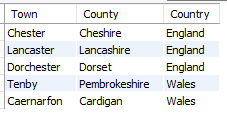Leaderboard
Popular Content
Showing content with the highest reputation on 03/02/2024 in all areas
-
You can. The trick is use a code block for consistent charater widths. EG... +------------+-------------+--------+-------+ | Field Name | Field Label | Width | Order | +------------+-------------+--------+-------+ |First Name | Given Name | 6 | 1 | |Last Name | Surname | 6 | 2 | +------------+-------------+--------+-------+ I've used json columns in the past. I have found it a good alternative to the EAV data model (PITA). For example, in my sample data below there is a product table with 3 categories of product. Each category has different attribute: Membership - type, duration Book - author, title T-shirt = size, colour, style In a conventional relational table each attribute would require its own column and most of them would be empty. The json version uses a single column. The other table was for testing arrays and accessing and joining on array elements. You would store the metadata in your database to define which attributes each category should have. +--------+-----------+-----------------------------+ | cat_id | cat_name | attributes | +--------+-----------+-----------------------------+ | 1 |Membership | ["Type", "Duration"] | | 2 |Book | ["Title", "Author"] | | 3 |T-shirt | ["Size", "Colour", "Style"] | +--------+-----------+-----------------------------+ TEST DATA CREATE TABLE `product_j` ( `product_id` int(11) NOT NULL AUTO_INCREMENT, `prod_name` varchar(45) DEFAULT NULL, `category_id` int(11) DEFAULT NULL, `attributes` json DEFAULT NULL, PRIMARY KEY (`product_id`) ) ENGINE=InnoDB AUTO_INCREMENT=10 DEFAULT CHARSET=utf8; INSERT INTO `product_j` VALUES (1,'Standard Membership (12 months)',1,'{\"Type\": \"S\", \"Duration\": 12}'),(2,'Premium Membership (3 months)',1,'{\"Type\": \"P\", \"Duration\": 3}'),(3,'Brave New World',2,'{\"Title\": \"Brave New World\", \"Author\": \"Aldus Huxley\"}'),(4,'Philosophers Stone',2,'{\"Title\": \"Harry Potter and the Philosophers Stone\", \"Author\": \"JK Rowling\"}'),(5,'T-Shirt 1',3,'{\"Size\": \"M\", \"Color\": \"Red\", \"Style\": \"V-neck\"}'),(6,'T-Shirt 2',3,'{\"Size\": \"L\", \"Color\": \"White\", \"Style\": \"V-neck\"}'),(7,'T-Shirt 3',3,'{\"Size\": \"L\", \"Color\": \"Red\", \"Style\": \"V-neck\"}'),(8,'T-Shirt 4',3,'{\"Size\": \"L\", \"Color\": \"Black\", \"Style\": \"crew-neck\"}'),(9,'Goblet of Fire',2,'{\"Title\": \"Harry Potter and the Goblet of Fire\", \"Author\": \"JK Rowling\"}'); +------------+---------------------------------+-------------+------------------------------------------------------------------------------+ | product_id | prod_name | category_id | attributes | +------------+---------------------------------+-------------+------------------------------------------------------------------------------+ | 1 | Standard Membership (12 months) | 1 | {"Type": "S", "Duration": 12} | | 2 | Premium Membership (3 months) | 1 | {"Type": "P", "Duration": 3} | | 3 | Brave New World | 2 | {"Title": "Brave New World", "Author": "Aldus Huxley"} | | 4 | Philosophers Stone | 2 | {"Title": "Harry Potter and the Philosophers Stone", "Author": "JK Rowling"} | | 5 | T-Shirt 1 | 3 | {"Size": "M", "Color": "Red", "Style": "V-neck"} | | 6 | T-Shirt 2 | 3 | {"Size": "L", "Color": "White", "Style": "V-neck"} | | 7 | T-Shirt 3 | 3 | {"Size": "L", "Color": "Red", "Style": "V-neck"} | | 8 | T-Shirt 4 | 3 | {"Size": "L", "Color": "Black", "Style": "crew-neck"} | | 9 | Goblet of Fire | 2 | {"Title": "Harry Potter and the Goblet of Fire", "Author": "JK Rowling"} | +------------+---------------------------------+-------------+------------------------------------------------------------------------------+ CREATE TABLE `json_test` ( `id` int(11) NOT NULL AUTO_INCREMENT, `jdata` json DEFAULT NULL, `role` json DEFAULT NULL, `name` varchar(45) DEFAULT NULL, PRIMARY KEY (`id`) ) ENGINE=InnoDB AUTO_INCREMENT=6 DEFAULT CHARSET=utf8; INSERT INTO `json_test` VALUES (1,'{\"town\": \"Chester\", \"county\": \"Cheshire\", \"country\": 1}','[1, 2, 3]','Peter'),(2,'{\"town\": \"Tenby\", \"county\": \"Pembrokeshire\", \"country\": 3}','[1, 3]','Paul'),(3,'{\"town\": \"Lancaster\", \"county\": \"Lancashire\", \"country\": 1}','[1, 2, 4]','Mary'),(4,'{\"town\": \"Dorchester\", \"county\": \"Dorset\", \"country\": 1}','[2, 4]','Jane'),(5,'{\"town\": \"Caernarfon\", \"county\": \"Cardigan\", \"country\": 3}','[1, 2, 3, 4]','Fred'); +----+-------------------------------------------------------------+--------------+-------+ | id | jdata | role | name | +----+-------------------------------------------------------------+--------------+-------+ | 1 | {"town": "Chester", "county": "Cheshire", "country": 1} | [1, 2, 3] | Peter | | 2 | {"town": "Tenby", "county": "Pembrokeshire", "country": 3} | [1, 3] | Paul | | 3 | {"town": "Lancaster", "county": "Lancashire", "country": 1} | [1, 2, 4] | Mary | | 4 | {"town": "Dorchester", "county": "Dorset", "country": 1} | [2, 4] | Jane | | 5 | {"town": "Caernarfon", "county": "Cardigan", "country": 3} | [1, 2, 3, 4] | Fred | +----+-------------------------------------------------------------+--------------+-------+ There's also a conventional country table +------------+--------------+ | country_id | country_name | +------------+--------------+ | 1 | England | | 2 | Scotland | | 3 | Wales | | 4 | Ireland | | 5 | France | | 6 | Italy | +------------+--------------+ TEST SQL QUERIES Alternative versions of same query (JSON_UNQUOTE vs double-arrow). Join on json array element. SELECT JSON_UNQUOTE(jdata->'$.town') as Town , JSON_UNQUOTE(jdata->'$.county') as County , country_name as Country FROM json_test j JOIN country c ON c.country_id = j.jdata->'$.country' ORDER BY jdata->'$.country'; SELECT jdata->>'$.town' as Town , jdata->>'$.county' as County , country_name as Country FROM json_test j JOIN country c ON c.country_id = j.jdata->'$.country' ORDER BY jdata->'$.country'; Search on json data SELECT product_id , attributes->>'$.Color' as color , attributes->>'$.Style' as size FROM products.product_j WHERE attributes->>'$.Size' = 'L' AND category_id = 3; Update json data UPDATE product_j SET attributes = JSON_SET(attributes, "$.Style", "Turtleneck") WHERE product_id = 8; I hope this gives a flavour of using json data. I wouldn't recommend using it all the time, as it breaks normalization rules, but it has its uses.1 point
This leaderboard is set to New York/GMT-04:00



